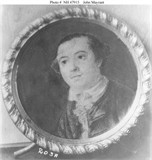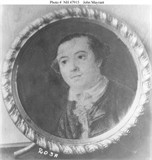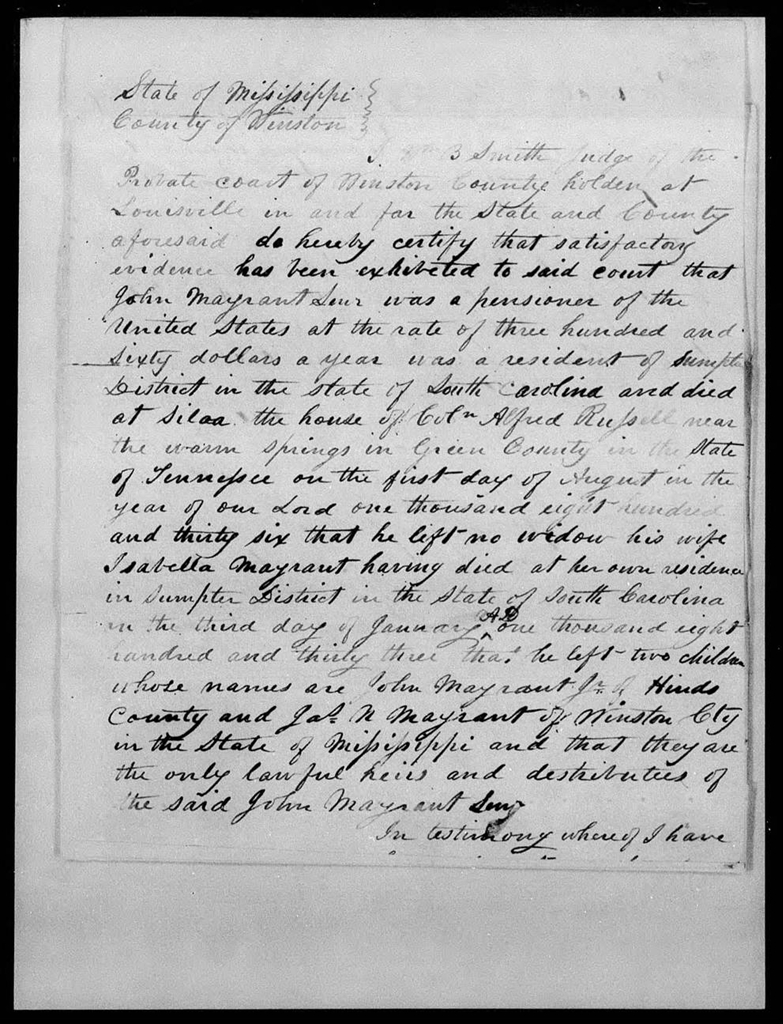Application for Revolutionary War pension;
On this fourteenth day of July in the Year of our Lord one thousand eight hundred and thirty two, personally appeared in open court before the honourable Henry Wm. Desaussure and the Chancellors of the said State in the Court of Equity – sitting. Captain John Mayrant Senior a resident of the High Hills of Santee in the District of Sumter and the state aforesaid, who will during this month attain the age of seventy years, and who being duly sworn according to law, doth on his oath make the following declaration in order to obtain the benefit of Act of Congress passed June 1832.
That he the said John Mayrant Senior was born in the year of Seventeen hundred and sixty two (1762) in the parish of St. James Santee, Charleston District; that after the death of his parents, he moved to Charleston where he was raised by his aunt Judith Pringle the mother of the former Attorney General of South Carolina, John Julius Pringle, now alive and residing in Charleston, in whose possession the deponent believes that the family Bible containing the record of his age is now to be found. That the deponent is the brother of William Mayrant member of Congress from South Carolina in 1816, who died during the present year. That the deponent resided in Charleston till 1778, when at the age of about sixteen he entered the naval service of South Carolina. That in the winter of 1777 the Legislature of South Carolina passed an act to raise a naval force and appointed Alexander Gillon Commodore and three Captains, William Robertson, John Joyner, and John McQueen, who were directed to go to France and build or buy three frigates and man and equip them.
That Commodore Gillon was to command the whole force and to appoint officers. That the deponent procured from Commodore Gillon the appointment of Midshipman through the intervention of his friends Thomas Lynch, Elias –orry, and William Bull Junior the cousin of the Lieut. Gov. William Bull who took the side of the British when the Revolution broke out. This was about the seventh of May 1778, and in August following the deponent sailed with Commodore Gillon for Havana in the sloop Tartar which had been purchased by the Commodore for the State. At the Havana they separated; that deponent was sent with Captain Robertson to France in the French Letter of Marque the Gustavson and landed at Nantes. That Commodore Gillon went to Spain and came over later to nantes.
That the indigo shipped by the State of South Carolina to Commodore Gillon as remittance was for the most part captured, and he had to delay fitting out his force until he could procure a loan in France.
That at this time the deponent learnt that Commodore Paul Jones was at L' Orient, France, preparing armament for sea; and the deponent got permission of Commodore Gillon to leave service of his squadron.
That accordingly the deponent set out for L' Orient, and aided by a letter of introduction from Dr. Benjamin Franklin which Commodore Gillon procured for him, he succeeded in his object.
That Commodore Jones received him kindly and appointed him Midshipman and Aid. This was in June 1779. that they sailed in July or about August as well as the following vessels conferring the squadron the Bon Homme Richard, Commodore Jones, Frigate Alliance, Captain Landais, Pallas, and Vengeance, Captain Ricault. That they sailed up the British Channel and back, and went through the Gi--- Channel, passed between Scotland and Ireland and went round Scotland into the German Ocean [normally now called the North Sea] They were driven off by a gale and that in a few days afterward Paul Jones fought his battle with the Serapis and Countess Scarborough, the particulars of which are a matter of history and not repeated here. That in boarding the Serapis the deponent who closely followed Lieut. Dale received a pike wound between the knee and ankle, which went entirely through and after the fight was over gave him great pain, and he was unable to put his foot to the ground for three months.
That the prizes were carried into the Texel, where soon after their arrival, the deponent received orders from Commodore Gillon to report to Amsterdam, where he was fitting out the frigate South Carolina, which he had purchased. That deponent joined him immediately in October or November 1779 and Commodore Gillon was pleased to promote him to Lieutenancy, and deponent was commissioned accordingly. That the Commodore put to sea in the South Carolina, sailed into the German Ocean, around Scotland, and thence to Spain, went into Corunna, thence to Charleston, off which they cruised, it being in possession of the English. Sailed thence to the West Indies and captured Jamaica ships in the Gulph and carried them to Havana. Conveyed the Governor of Havana with 70 transports to the Bahamas which they took. Thence they sailed to Philadelphia, refilled there, and Commodore Gillon dropped down to New Castle.
That at this time it was expected daily that Charleston would be evacuated by the British and Commodore Gillon sent the deponent and a Capt to Philadelphia supplied with money to buy a carriage and horses and proceed to Charleston, audit evacuated, to open a rendezvous for marines and seamen of whom he wanted about two hundred. That they reached Charleston soon after the evacuation. That shortly after their arrival they learnt that the frigate South Carolina in attempting to get to sea had been captured by three British frigates and the deponent states that his commission and papers and all that he owned were taken in her and lost to him forever. That the deponent was then ordered by Commodore Gillon to remain in Charleston and by his direction and that of the Governor Guerard to receive prisoners, and make exchanges. That he continued there under the order of Commodore Gillon until the peace, in 1783, when by the act of Legislature of South Carolina the naval force was discharged. That the act which discharged them allowed the officers of the frigate South Carolina a twelve months pay, which the deponent received, that is to say he received an intent which he was obliged to sell at what it would bring. It brought at the rate of ten pounds for every hundred.
That when discharged after the peace of 1783 the deponent was a commissioned 3 rd Lieutenant of the Frigate South Carolina; that his regular pay as such was twelve pounds stirling a month, exclusive of rations. That in the Fall after the peace, the deponent married……
That the deponent having failed to state above who were the officers on board the South Carolina when she left Amsterdam now add that Commodore Gillon was the Commander, Peter Auriel was the first Lieutenant, and Powers the 3 rd Lieut. That the deponent remained at Amsterdam about 18 months, and that deponent was promoted to the Lieutenancy in about 3 months before they sailed. That the frigate was at Philadelphia just before her capture Thomas White was 1 st Lieut. in place of Peter Auriel who had been captured for holding a correspondence with Sir Joseph York the British Ambassador at the Hague. 2 nd Lieut. Nathaniel Marston in place of Bartlett who had resigned and left the ship at Corunna. The deponent was the 3rd Lieut. Fitzgerald was the 4th and Robert Coram the 5th.
That the deponent hereby relinquishes all claim whatever to a pension or annuity except the present and declares that his name is not on the pension roll of the agency of any state.
His revolutionary war pension was transferred from South Carolina to Mobile, Alabama in September of 1835.
Transcripts very kindly supplied by Susan and Tom Mayrant.
His shipmate and good friend was Nathaniel Ingraham who served with him aboard the Bon Homme Richard in the battle with the Serapis and is buried in St. Michael’s Church cemetery in Charleston.
Application for Revolutionary War pension;
On this fourteenth day of July in the Year of our Lord one thousand eight hundred and thirty two, personally appeared in open court before the honourable Henry Wm. Desaussure and the Chancellors of the said State in the Court of Equity – sitting. Captain John Mayrant Senior a resident of the High Hills of Santee in the District of Sumter and the state aforesaid, who will during this month attain the age of seventy years, and who being duly sworn according to law, doth on his oath make the following declaration in order to obtain the benefit of Act of Congress passed June 1832.
That he the said John Mayrant Senior was born in the year of Seventeen hundred and sixty two (1762) in the parish of St. James Santee, Charleston District; that after the death of his parents, he moved to Charleston where he was raised by his aunt Judith Pringle the mother of the former Attorney General of South Carolina, John Julius Pringle, now alive and residing in Charleston, in whose possession the deponent believes that the family Bible containing the record of his age is now to be found. That the deponent is the brother of William Mayrant member of Congress from South Carolina in 1816, who died during the present year. That the deponent resided in Charleston till 1778, when at the age of about sixteen he entered the naval service of South Carolina. That in the winter of 1777 the Legislature of South Carolina passed an act to raise a naval force and appointed Alexander Gillon Commodore and three Captains, William Robertson, John Joyner, and John McQueen, who were directed to go to France and build or buy three frigates and man and equip them.
That Commodore Gillon was to command the whole force and to appoint officers. That the deponent procured from Commodore Gillon the appointment of Midshipman through the intervention of his friends Thomas Lynch, Elias –orry, and William Bull Junior the cousin of the Lieut. Gov. William Bull who took the side of the British when the Revolution broke out. This was about the seventh of May 1778, and in August following the deponent sailed with Commodore Gillon for Havana in the sloop Tartar which had been purchased by the Commodore for the State. At the Havana they separated; that deponent was sent with Captain Robertson to France in the French Letter of Marque the Gustavson and landed at Nantes. That Commodore Gillon went to Spain and came over later to nantes.
That the indigo shipped by the State of South Carolina to Commodore Gillon as remittance was for the most part captured, and he had to delay fitting out his force until he could procure a loan in France.
That at this time the deponent learnt that Commodore Paul Jones was at L' Orient, France, preparing armament for sea; and the deponent got permission of Commodore Gillon to leave service of his squadron.
That accordingly the deponent set out for L' Orient, and aided by a letter of introduction from Dr. Benjamin Franklin which Commodore Gillon procured for him, he succeeded in his object.
That Commodore Jones received him kindly and appointed him Midshipman and Aid. This was in June 1779. that they sailed in July or about August as well as the following vessels conferring the squadron the Bon Homme Richard, Commodore Jones, Frigate Alliance, Captain Landais, Pallas, and Vengeance, Captain Ricault. That they sailed up the British Channel and back, and went through the Gi--- Channel, passed between Scotland and Ireland and went round Scotland into the German Ocean [normally now called the North Sea] They were driven off by a gale and that in a few days afterward Paul Jones fought his battle with the Serapis and Countess Scarborough, the particulars of which are a matter of history and not repeated here. That in boarding the Serapis the deponent who closely followed Lieut. Dale received a pike wound between the knee and ankle, which went entirely through and after the fight was over gave him great pain, and he was unable to put his foot to the ground for three months.
That the prizes were carried into the Texel, where soon after their arrival, the deponent received orders from Commodore Gillon to report to Amsterdam, where he was fitting out the frigate South Carolina, which he had purchased. That deponent joined him immediately in October or November 1779 and Commodore Gillon was pleased to promote him to Lieutenancy, and deponent was commissioned accordingly. That the Commodore put to sea in the South Carolina, sailed into the German Ocean, around Scotland, and thence to Spain, went into Corunna, thence to Charleston, off which they cruised, it being in possession of the English. Sailed thence to the West Indies and captured Jamaica ships in the Gulph and carried them to Havana. Conveyed the Governor of Havana with 70 transports to the Bahamas which they took. Thence they sailed to Philadelphia, refilled there, and Commodore Gillon dropped down to New Castle.
That at this time it was expected daily that Charleston would be evacuated by the British and Commodore Gillon sent the deponent and a Capt to Philadelphia supplied with money to buy a carriage and horses and proceed to Charleston, audit evacuated, to open a rendezvous for marines and seamen of whom he wanted about two hundred. That they reached Charleston soon after the evacuation. That shortly after their arrival they learnt that the frigate South Carolina in attempting to get to sea had been captured by three British frigates and the deponent states that his commission and papers and all that he owned were taken in her and lost to him forever. That the deponent was then ordered by Commodore Gillon to remain in Charleston and by his direction and that of the Governor Guerard to receive prisoners, and make exchanges. That he continued there under the order of Commodore Gillon until the peace, in 1783, when by the act of Legislature of South Carolina the naval force was discharged. That the act which discharged them allowed the officers of the frigate South Carolina a twelve months pay, which the deponent received, that is to say he received an intent which he was obliged to sell at what it would bring. It brought at the rate of ten pounds for every hundred.
That when discharged after the peace of 1783 the deponent was a commissioned 3 rd Lieutenant of the Frigate South Carolina; that his regular pay as such was twelve pounds stirling a month, exclusive of rations. That in the Fall after the peace, the deponent married……
That the deponent having failed to state above who were the officers on board the South Carolina when she left Amsterdam now add that Commodore Gillon was the Commander, Peter Auriel was the first Lieutenant, and Powers the 3 rd Lieut. That the deponent remained at Amsterdam about 18 months, and that deponent was promoted to the Lieutenancy in about 3 months before they sailed. That the frigate was at Philadelphia just before her capture Thomas White was 1 st Lieut. in place of Peter Auriel who had been captured for holding a correspondence with Sir Joseph York the British Ambassador at the Hague. 2 nd Lieut. Nathaniel Marston in place of Bartlett who had resigned and left the ship at Corunna. The deponent was the 3rd Lieut. Fitzgerald was the 4th and Robert Coram the 5th.
That the deponent hereby relinquishes all claim whatever to a pension or annuity except the present and declares that his name is not on the pension roll of the agency of any state.
His revolutionary war pension was transferred from South Carolina to Mobile, Alabama in September of 1835.
Transcripts very kindly supplied by Susan and Tom Mayrant.
His shipmate and good friend was Nathaniel Ingraham who served with him aboard the Bon Homme Richard in the battle with the Serapis and is buried in St. Michael’s Church cemetery in Charleston.
Family Members
Advertisement
Advertisement








